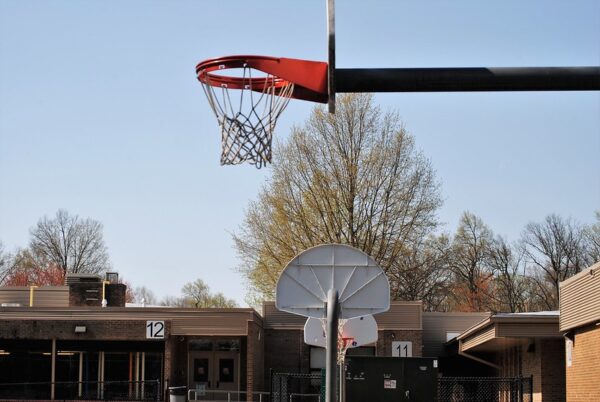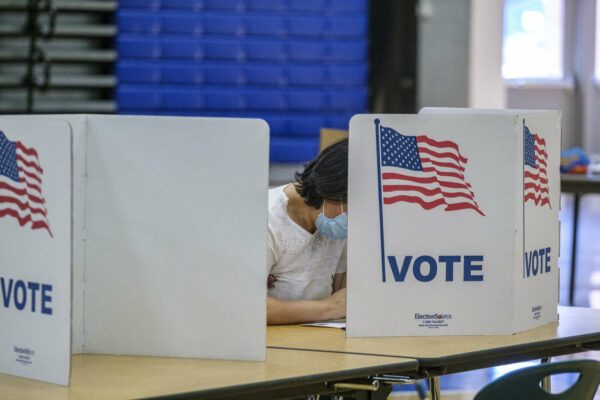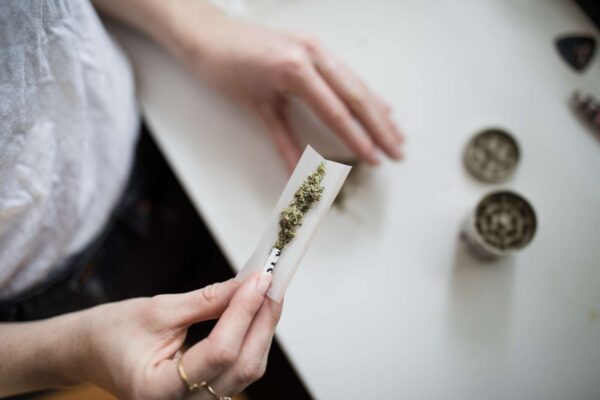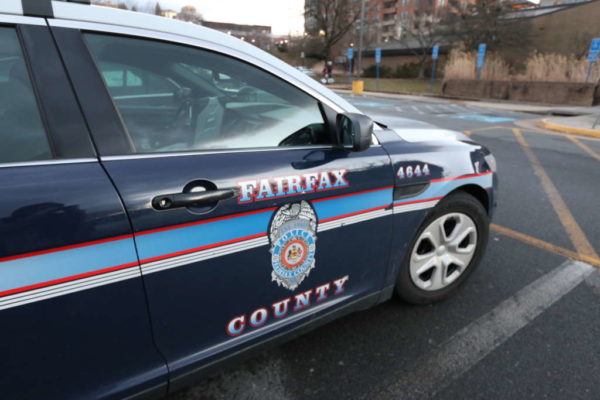
Virginia General Assembly Convenes for Special Session — “The General Assembly returns on Monday to the Capitol it left 17 months ago as the coronavirus first gripped Virginia…Legislators meeting in a scheduled two-week special session have just two tasks on their to-do list, both highly consequential: allocating $4.3 billion in federal coronavirus relief funds and appointing a slew of judges to the state’s second-highest court.” [The Washington Post]
Fairfax County Man Arrested for Participating in Capitol Breach — “A Fairfax County, Virginia, man was arrested on six charges Thursday after a high school acquaintance tipped off the FBI about his alleged participation in the Capitol riot on January 6…[Luke Wessley] Bender faces six counts, including a felony count of obstruction of Congress that carries a maximum sentence of up to 20 years in prison.” [WUSA9]
Reston Community Center Candidate Filing Now Open — “Help your community by becoming a candidate for RCC’s Board of Governors. Candidate filing for the 2021 RCC Preference Poll is now open. Please download the candidate handbook and candidacy statement from our website and return by August 15.” [RCC/Facebook]
Reston Community Remembers Local Humanitarian — Described as a “pioneer, humanitarian, and entrepreneur,” longtime Reston resident Burton “Burt” Emmanuel Lamkin died on June 24 at the age of 86. Though he went to California a few years ago to be closer to family, he and his wife Kathryne were among the first African Americans to live in Reston when they moved there in 1966, and he was heavily involved in the Rotary Club of Herndon. [Connection Newspapers]
Photos: Reston Association Hosts Annual Tennis Tournament — “The 2021 Reston Simon Cup tennis tournament was held from mid through late July. Men’s and women’s singles and doubles matches were played at the Lake Newport tennis courts.” [RA/Facebook]

Fairfax County took a first step yesterday toward potentially taxing plastic bags used by grocery stores and other retailers.
The Board of Supervisors voted 9-1 yesterday (Tuesday) to direct county staff to draft an plastic bag tax ordinance, but even supporters of the measure allowed that there remains some uncertainty around how exactly the tax would be implemented if approved.
“Let’s definitely try this, but we may end up back in the General Assembly in the foreseeable future to try to get clarification,” Hunter Mill District Supervisor Walter Alcorn said, noting that the county is subject to the Dillon rule. “…This is probably a prime example of when we probably need a little more flexibility, but I’m all for it.”
The Virginia General Assembly passed legislation during its 2020 session giving localities the authority to impose a five-cent tax on disposable plastic bags, starting on Jan. 1, 2021.
Roanoke became the first jurisdiction to take advantage of the new law when it adopted an ordinance in May that’s set to take effect on Jan. 1, 2022.
Under House Bill 534, which was identical to Senate Bill 11, cities and counties can tax each disposable plastic bag provided to customers by grocery stores, convenience stores, and drugstores. The tax would not apply to plastic bags designed to be reused, garbage bags, bags used to hold or package food to avoid damage or contamination, and ones used to carry prescription drugs or dry cleaning.
The legislation allows retailers to retain two cents from the imposed tax on each bag until Jan. 1, 2023, when the amount that goes to retailers drops to one cent.
That “dealer discount” provision is intended to help offset additional expenses retailers might incur from adjusting their operations, but it also puts added pressure on localities to adopt an ordinance as soon as possible, according to Board of Supervisors Chairman Jeff McKay.
“We want to start the process of the ordinance review, looking at the language, the public input, because the clock literally is ticking,” McKay said.
Complicating matters is the fact that the Virginia Department of Taxation has not yet released guidelines clarifying what a plastic bag tax ordinance should look like, leaving questions around the definition of a grocery or convenience store, how the tax will be enforced, and other issues, County Executive Bryan Hill told the board in a Nov. 30 memorandum.
Braddock District Supervisor James Walkinshaw, who introduced the board matter on Tuesday, said the draft guidance that county staff has seen and provided input on through the Northern Virginia Regional Commission will clear up many of those questions.
He hopes the guidelines will be finalized soon so county staff can incorporate them into the ordinance that they have now been directed to draft and present to the board in September.
Springfield District Supervisor Pat Herrity, the lone Republican on the board, opposed the board matter, taking issue with the timing of the proposal. Read More

General Assembly to Hold Special Session in August — “Governor Ralph Northam today [Wednesday] issued a proclamation calling the members of the General Assembly into special session on Monday, August 2. A special session is necessary to fill judicial vacancies and allocate more than $4.3 billion in federal relief funding.” [Office of the Governor]
TJ Admissions Changes Result in Increased Diversity — The Thomas Jefferson High School for Science and Technology Class of 2025 will include more Black and Hispanic students, more girls, and more economically disadvantaged students than past years, according to Fairfax County Public Schools data. This is the first cohort to be admitted under a new admissions system that ditched the magnet school’s usual admissions test and $100 application fee. [The Washington Post]
Herndon Office Building Sold — The investment company Boyd Watterson Asset Management has purchased a 160,000 square-foot office building at 13651 McLearen Road for $48 million. The McLearen Center is in the same complex as the Transportation Security Administration’s Freedom Center and Nysmith School, and it counts Boeing as a long-term tenant, though the lease is set to expire in May 2022. [Washington Business Journal]
Reston Contractor Reports Medicaid Data Breach — Maximus Corp., a government health data services provider based in Reston, says a data breach that occurred between May 17 and 19 exposed the personal information of more than 334,000 Medicaid healthcare providers nationwide. The incident did not affect information about patients or Medicaid beneficiaries, according to the company. [Information Security Media Group]
Irish Rock Band Joins Arrowbrook Concert Lineup — The D.C.-based Irish rock band Scythian will perform at Arrowbrooke Centre Park in Herndon on July 17 as part of Fairfax County’s Music at Arrowbrook Centre concert series, one of several free summer concert series organized by the county park authority. [Fairfax County Park Authority]
Photo via vantagehill/Flickr
(Updated at 11:10 p.m.) Del. Ken Plum easily defeated his first primary opponent in more than two decades today (Tuesday), earning 75% of the vote, according to the Virginia Department of Elections’ unofficial results.
Plum has served as delegate for Virginia’s 34th House District, which encompasses Reston, since 1982, but he faced a rare Democratic challenger this year in data analyst and political newcomer Mary Barthelson, who announced her candidacy in March.
Plum will now face his first Republican challenger since 2011 in November’s general election, when he will vie for the seat with veteran and security consultant Matt Lang.
Herndon voters got a more competitive primary, as challenger Irene Shin eked out a victory in the 86th House District race over incumbent Del. Ibraheem Samirah, who was seeking his second full term in office.
After Fairfax County took a while to count absentee ballots, all 17 precincts were finally reported just after 11 a.m. Shin received 3,415 votes — or 51.7% — while Samirah got 3,185, or 48.3%, making the race the closest of the night that resulted in an incumbent defeat.
In the statewide races, former Virginia Gov. Terry McAuliffe handily won the Democratic Party’s gubernatorial nomination, receiving more than 60% of the votes cast — roughly three times as many votes as his nearest competitor, former Del. Jennifer Carroll Foy, who was seeking to become Virginia’s first Black, female governor.
Carroll Foy received about 20% of the vote, followed in descending order by state Sen. Jennifer McClellan, Lt. Gov. Justin Fairfax, and Del. Lee Carter, who also lost his seat representing the 50th House District.
McAuliffe will compete in November’s general election against businessman Glenn Youngkin, who won the Republican gubernatorial nomination in an “unassembled” convention in May.
The Democratic ticket will be completed by Del. Hala Ayala (D-51st District), who beat six other candidates to snag the lieutenant governor nomination, and Attorney General Mark Herring, who bested challenger Jay Jones as he seeks a third consecutive term in the position.
The Republican Party nominated former Del. Winsome Sears for lieutenant governor and Virginia Beach Del. Jason Miyares for attorney general.
In its unofficial returns, the Fairfax County Office of Elections reported a voter turnout of 11.1%, a relatively low rate that’s not especially unusual for an off-year primary. The 2017 Democratic primary, the last year with a gubernatorial race on the ballot, saw a 13.4% turnout.
According to the county, 21,493 voters — 2.9% of the electorate — cast absentee ballots either by mail or in-person, while 60,999 people went to the polls on the day of the primary. In comparison, the 2017 Democratic primary saw just 7,105 absentee voters compared to 86,931 primary day voters.
Virginia Raises Minimum Wage on May Day — Effective Saturday (May 1), Virginia’s minimum wage went up from $7.25 per hour to $9.50, the state’s first increase since 2009. Wages could rise to $15 in 2026, if approved by the General Assembly in 2024. Localities now also have the authority to adopt ordinances allowing collective bargaining with public employees. [DCist]
Twin Sheep Born at Frying Pan Farm Park — “Frying Pan Farm Park’s Suffolk ewe, Bristol, delivered the last of the sheep births that the farm will see this spring. Her twin ewes arrived April 11.” [Fairfax County Park Authority/Twitter]
Dulles Greenway Hosts First “Run the Greenway” Races — The first annual “Run the Greenway” race in Loudoun County attracted more than 1,400 runners and raised over $156,000 for 27 different area nonprofits on Saturday. The event featured 5K, 10K, and 800-meter Kids Fun Run races with staggered start times for social distancing as well as a virtual option. [Loudoun Now]
Porcupine Quills Seized at Dulles Airport — Customs and Border Protection seized 100 porcupine quills from a U.S. citizen who came to Dulles International Airport from Africa on April 21. The Centers for Disease Control and Prevention told CBP to seize the quills, because they are a potential vector for the monkeypox virus. [CBP]
The Water Mine Seeking New Lifeguards — The Water Mine Family Swimmin’ Hole in Reston is hiring more than 150 lifeguards for the upcoming summer season. Several drive-thru, socially distanced job fairs will be held on site (1400 Lake Fairfax Drive) throughout May, with the first event coming on Friday (May 7) from 4-6 p.m. [Fairfax County Park Authority]
Photo via vantagehill/Flickr
(Updated at 4 p.m.) Starting July 1, adults 21 and older in Virginia can legally possess up to one ounce of marijuana.
Ahead of that date, local police departments say they are preparing their officers, while advocates say the bill needs serious retooling to keep kids out of the juvenile justice system and help reverse the harm done to Black and brown communities after decades of unequal enforcement.
“We still have time to fix many of these things,” Chelsea Higgs Wise, executive director of the racial justice and cannabis advocacy group Marijuana Justice, said. “Between now and then, we have elections. We have to talk to people about how they’re going to take this legalization forward while centering equity. This is not over.”
The Virginia General Assembly passed a law earlier this month accelerating the legalization of weed from July 2024 to this coming summer. The law will be reenacted in 2024, when recreational, commercial sales are legalized.
Through June 30, the possession of less than one ounce of cannabis will remain “decriminalized” — that is, it is penalized with a fine, but the incident does not show up on a person’s criminal record.
The new law legalizing cannibis essentially permits those 21 and older to use marijuana inside their homes, and possibly in their backyards; grow up to four plants; and possess up to one ounce of cannabis. The plant must be in a manufacturer’s container for someone to drive with it in the car legally.
Giving cannabis to someone underage is considered a felony, while students younger than 21 who are found in possession of the plant on school grounds would be charged with a misdemeanor. A clause requires court-ordered drug treatment services for individuals 20 and under found with the plant.
People in jail for marijuana-related crimes will remain there, Virginia Mercury reports.
Here are the top areas of interest and concern for police officers, people in the criminal justice system and advocates.
Marijuana-related arrests
Although marijuana-related arrests have been trending down recently, Falls Church City Police Chief Mary Gavin says that one potential consequence of marijuana legalization is more people driving while stoned.
“There are going to be obviously growing pains,” Gavin said. “My biggest concern, in terms of public safety, is the possible increase of driving under the influence.”
According to data provided to Tysons Reporter by the police departments, cannabis arrests appear to be trending down slightly in both Fairfax County and Falls Church City. A chart supplied by Fairfax County Police Department shows arrest rates peaking in 2018 before dropping off dramatically in 2020.
The Falls Church City Police Department reported a similar pattern. It made 61 and 63 arrests in 2018 and 2019, respectively, followed by 17 arrests in 2020 and none so far this year.
Herndon Police Department spokesperson Lisa Herndon said the town had about 125 marijuana-related arrests from Jan. 1, 2018 to Dec. 13, 2020.
Gavin attributed the recent drop-off in arrests to a combination of the COVID-19 pandemic and a policy change introduced by Fairfax County Commonwealth’s Attorney Steve Descano, who ceased prosecuting simple marijuana possession cases against adults when he took office on Jan. 2, 2020.
Descano told Tysons Reporter, Reston Now’s affiliate site, that he stopped prosecuting marijuana cases because it would be the right approach for community safety and racial equity. His office estimates that more than 1,000 cases have since been dismissed.
“While the opposition to this decision was intense at the time — so much so that we planned to create a bail fund in case our attorneys were held in contempt of court and jailed — I am pleased that other jurisdictions followed suit and marijuana has now been legalized across the Commonwealth,” Descano said. Read More
 This is an opinion column by Del. Ken Plum (D), who represents Reston in Virginia’s House of Delegates. It does not reflect the opinion of Reston Now.
This is an opinion column by Del. Ken Plum (D), who represents Reston in Virginia’s House of Delegates. It does not reflect the opinion of Reston Now.
During its Reconvened Session last week the General Assembly approved an amendment proposed by Governor Ralph Northam that decriminalizes the possession by adults of a small amount of marijuana effective July 1, 2021. Virginia joins 26 other states and the District of Columbia that have decriminalized small amounts of marijuana. This generally means certain small, personal-consumption amounts are a civil or local infraction, not a state crime (or are a lowest misdemeanor with no possibility of jail time). Based on the new law in Virginia, adults can grow up to four plants, gift it in private, or have an ounce or less in their possession if they are over 21. Selling, buying, or driving with marijuana remains illegal at this time. People given a summons for possession for an amount beyond the minimum will be issued a summons for marijuana possession for which they have the option of prepaying the civil penalty of $25 instead of going to court.
I voted for the Governor’s amendments as necessary to reflect the realities of marijuana possession and use. The people of Virginia will be no less safe as a result of these changes. Our jails will be less full of persons who use marijuana recreationally for themselves, and persons who do so will not be labeled a criminal. Previously marijuana possession was a criminal offense punishable by up to 30 days in jail and/or up to a $500 fine. Public opinion polls have shown that 83 percent of Virginians support lowering criminal possession to a fine and 61 percent support ending prohibition all together.
I also supported the changes in laws related to the use of medical cannabis in 2017. The law enacted at that time permitted patients suffering from intractable epilepsy to use some types of cannabis oil with a doctor’s certification. Subsequent amendments to that law allow patients with any condition to receive recommendations to use and purchase cannabis preparations with no more than 10 milligrams of THC per dose. Extracts sold under the provisions of this law must be produced by processors approved by the Virginia Board of Pharmacy. Thirty-three other states have similar laws related to the use of marijuana for medical purposes.
Retail sales of marijuana will not begin until January 1, 2024. Many complex issues remain to be resolved as to who will be certified to sell the product, how an illicit market will be controlled, and what the limitations on purchasing will be. The Joint Legislative Audit and Review Commission issued a 175-page report in November 2020, entitled “Key Considerations for Marijuana Legalization” that sets direction with options as to how the state should proceed with full legalization. There is a determination on the part of most legislators that the current system for labeling persons criminal and putting them in jail is not appropriate and that total reform is needed. Minority communities have been particularly hard hit by the current system. Much work remains to be done, but I believe Virginia is taking a responsible route to fixing the laws about weed.
 This is an opinion column by Del. Ken Plum (D), who represents Reston in Virginia’s House of Delegates. It does not reflect the opinion of Reston Now.
This is an opinion column by Del. Ken Plum (D), who represents Reston in Virginia’s House of Delegates. It does not reflect the opinion of Reston Now.
As we probably learned and as we teach our children, voting is the most important of civic duties. By choosing our leaders at election time and by deciding questions on referenda, we set the direction for our communities, states, and nation. Voting is a way to express our values and beliefs.
In one of the contradictions that strain the legitimacy of what we teach vs. what we do is to teach our children, proclaim in civic pronouncements and require for Scouting citizenship merit badges an acknowledgement of the importance of voting while at the same time making it difficult and sometimes impossible for some people to vote.
During the colonial period and early years of the state of Virginia, only white land-owners could vote. The Reconstruction era after the Civil War brought Black men into the electorate, but in a matter of decades that free access to voting was cut off by white supremacists who reasserted their power. An avowed purpose of writing a new constitution in 1902 was to disenfranchise Black men. It was successful in that the voting rolls were cut in half as most Blacks and poor whites were not able to make their way through the maze of requirements that one had to meet in order to vote. A blank sheet registration system and a $1.50 poll tax to be paid three years in a row at least six months before an election kept many from voting. White people in the upper crust of local society made it through these hurdles as the voting registrar who was part of the governing machine would provide them assistance while everyone else floundered at trying to get through the process.
Regardless of their race, women in this country have been able to vote for just over a hundred years, and that right came after incredible struggle. The Civil Rights era and the Voting Rights Act of 1965 opened up the electoral process for many Black people. Even now there are debates in the states about ways that access to the polls can be limited.
The Virginia General Assembly has put the Commonwealth on the path to supporting citizens carrying out their civic duty with several of the most progressive voting laws in the country. A headline in the New York Times last week proclaimed that “Virginia, the Old Confederacy’s Heart, Becomes a Voting Rights Bastion.” Over a fourteen-month period and two legislative sessions the General Assembly has passed and the Governor has signed bills to repeal a voter ID law, enact a 45-day no-excuse absentee voting period that permits early voting, made Election Day a holiday, and established a system for automatic voter registration for anyone who receives a Virginia driver’s license. The Virginia Voting Rights Act follows some of the provisions of the earlier federal law but applies to localities in the state to ensure that voting remains accessible.
In Virginia we will continue to say that voting is one of the most important of our civic duties, and now we will have a legal structure that demonstrates we believe it!

Marijuana Possession Will Soon Be Legal in Virginia — “The Virginia General Assembly agreed Wednesday to make it legal for adults to possess up to an ounce of marijuana on July 1, nearly three years sooner than had been approved by the legislature in February.” [The Washington Post]
County Residents Share Thoughts on Police Chief Search — Fairfax County Board of Supervisors Chairman Jeff McKay and Lee District Supervisor Rodney Lusk hosted a public input session on Tuesday (April 6) as part of the county’s ongoing search for a permanent successor to retired Police Chief Edwin Roessler Jr. McKay said the board will hold interviews for the position over the next week. [WTOP]
Reston Delegate Holds Post-Session Town Hall — After the Virginia General Assembly adjourned yesterday, Del. Ken Plum and State Sen. Janet Howell are holding a virtual town hall meeting at 7 p.m. today to discuss the 2021 session. Anyone interested in attending can register in advance for the Zoom link and submit questions to [email protected]. [Ken Plum]
Metro General Manager Calls Silver Line Phase 2 “A Priority” — Metro General Manager Paul Wiedefeld declined to commit to a “hard start date” for when the Silver Line’s second phase will open, but he told the Northern Virginia Transportation Alliance yesterday “want to get that out as quick as we can” because of the potential impact on ridership and the region’s economic development. [WTOP]
Democratic Candidates for Governor Spar in First Televised Debate — Five candidates vying for the Democratic Party’s nomination to become Virignia’s next governor discussed the pandemic, gun violence, and criminal justice reform during an hour-long event hosted by Virginia State University in Petersburg. [Virginia Mercury]
Reston Company Lands Billions in Defense Contracts — “On the heels of an $830 million U.S. Army contract won in February, Reston-based Science Applications International Corp. (SAIC) has landed two more Army contracts worth a combined $4.4 billion, it announced today.” [Virginia Business]
Photo via vantagehill/Flickr

This is an opinion column by Del. Ken Plum (D), who represents Reston in Virginia’s House of Delegates. It does not reflect the opinion of Reston Now.
Virginia made history last week: The Governor of Virginia Ralph Northam signed the bill that made Virginia the first state in the south and the 23rd state in the nation to end the death penalty! I made the nearly four-hour trip to the Greenville Correctional Center in Jarrett where the “death chamber” is located to be at this momentous occasion when another of my legislative goals was realized.
While some have justified the death penalty as an appropriate “eye for an eye” punishment and a deterrent for other crimes, the history of the death penalty is much more complex. Virginia executed more people than any other state having executed 1,390 people over its 413 years. Its uneven application among the states and within the state itself is astounding. Virginia executed 94 women over its history, twice as many as the state with the next most executions of women. Of those, 78 were Black, 11 were White and five were of unknown race. Sixteen children below the age of 18 were executed including a slave girl about 12 years old who was hung in 1825. In 2005 the United States Supreme Court declared that the execution of those under the age of 18 at the time of their crime was cruel and unusual punishment and hence unconstitutional. It followed an earlier decision in a Virginia case that found that executing an intellectually disabled person as the state was poised to do was unconstitutional.
Until the first electrocution in 1908, executions in Virginia were carried out by hanging making them not unlike the lynchings of Blacks that had occurred throughout the South. From 1900 until the U.S. Supreme Court declared the death penalty unconstitutional in 1977 for crimes in which no one was killed, Virginia executed 73 Black defendants for rape, or attempted or armed robbery that did not result in death, while no White defendants were executed for those crimes.
Other numbers show how the death penalty was more an act of White supremacy than for public safety. Between 1900 and 1999, there were 377 executions and of those 296 were Black persons and 79 White persons. For murder there were 304 executions, 223 Black and 79 White persons. For rape 48 Black persons and for attempted rape 20 Black persons executed, and in both instances no White persons were executed.
One of the most unbelievable stories in the history of the death penalty in Virginia was the execution of five Black defendants on February 2, 1951, and the execution of two more Black men on February 5, 1951, accused of raping a White woman. An all-White jury meted out the punishment after trials that lasted one day per defendant.
We cannot rewrite this dark chapter of Virginia’s history, but we must learn from it. Too many laws in the past were written to maintain White supremacy rather than protect the public equally. The General Assembly has made major strides at ridding the Code of Jim Crow laws. We can see the repeal of the death penalty as a major step in moving Virginia forward as a more just state.
 This is an opinion column by Del. Ken Plum (D), who represents Reston in Virginia’s House of Delegates. It does not reflect the opinion of Reston Now.
This is an opinion column by Del. Ken Plum (D), who represents Reston in Virginia’s House of Delegates. It does not reflect the opinion of Reston Now.
 This is an opinion column by Del. Ken Plum (D), who represents Reston in Virginia’s House of Delegates. It does not reflect the opinion of Reston Now.
This is an opinion column by Del. Ken Plum (D), who represents Reston in Virginia’s House of Delegates. It does not reflect the opinion of Reston Now.
To paraphrase Benjamin Franklin who when asked at the conclusion of the Constitutional Convention in Philadelphia what kind of government had been formed replied, “a republic if we can keep it!” As the General Assembly concluded the work of its annual session this past weekend the same kind of question could be posed as the changes in the Commonwealth’s laws and governance have been so profound. The answer I believe is a progressive state measured not by southern standards but by comparison to all the other states. At the ballot box the state over the last several years has gone from red to purple to blue. All statewide elected officials are Democrats, and both houses of the General Assembly have been controlled by Democrats since the elections in 2019. Far more meaningful than the partisan labels of elected officials are the changes that have taken place in the laws of the Commonwealth.
In the regular and a special session of the General Assembly last year, historic legislation was passed including ratification of the Equal Rights Amendment and lifting of barriers to abortion. Jim Crow era laws were repealed, and the Virginia Values Act prohibiting discrimination in housing and employment was passed. Bills to reduce gun violence were passed as were bills to reduce the school to prison pipeline. Criminal justice and policing reform bills were passed. And more.
In the session that just ended, criminal justice reform continued. The death penalty was abolished, and criminal defendants and civil litigants were granted an automatic right to appeal that exists in every other state. My bill that ended excessive fines and prison time for petit larceny passed. Criminal records for many nonviolent offenses will be expunged under a new law. And more. Details for both sessions are at https://lis.virginia.gov.
All of these changes along with record levels of funding for COVID-19 relief and pay raises for teachers, police and other essential workers have led to references about Virginia being the leader among states in progressive legislation. The first ever woman Speaker of the House of Delegates Eileen Filler-Corn said that the House Democratic majority elected in 2019 “has kept its promise to protect families, keep Virginia healthy and rebuild our economy stronger.”
As one who served during years when the news coming from Richmond was not so good, I am aware that these reforms passed with barely a majority of Democratic legislator votes and a rare and scant few of Republican legislator votes. Attention is already shifting to the fall when the governor, lieutenant governor and attorney general will be elected along with all 100 members of the House of Delegates. The progressive reforms will be on the ballot: do we build on them in the future or do we turn back the clock? Already a former governor, two Black women, and a self-avowed socialist are running for the Democratic nomination for governor and a self-proclaimed “Trump in high heels” and a staunch opponent of abortion rights are among those seeking the Republican nomination. There is likely to be a record number of candidates running for the House of Delegates. The voters in November will ultimately decide if we keep our progressive state!
 This is an opinion column by Del. Ken Plum (D), who represents Reston in Virginia’s House of Delegates. It does not reflect the opinion of Reston Now.
This is an opinion column by Del. Ken Plum (D), who represents Reston in Virginia’s House of Delegates. It does not reflect the opinion of Reston Now.
One of the meaningful traditions that has evolved in the Virginia House of Delegates over the last couple of decades has been the celebration of Black History Month by having a speech each day on the House floor about famous Black persons and their struggles and accomplishments in the Commonwealth. According to History magazine, Black History Month is an annual celebration of achievements by African Americans and a time for recognizing their central role in U.S. history. Also known as African American History Month, the event grew out of “Negro History Week,” the brainchild of noted historian Carter G. Woodson and other prominent African Americans. Since 1976 the month of February has been designated as Black History Month and is celebrated around the world, including in Canada and the United Kingdom.
Virginia has a unique role in Black history. The first enslaved Blacks arrived in Virginia in 1619, and the labors of these persons were central to the growth of the Virginia colony and then state. It was Black laborers who built the grand plantations’ homes and the institutions of higher education while themselves living in meager housing and refused entrance into public schools and colleges. It was Black slave labor that built the early Virginia tobacco economy while being denied all but the most limited income. Black persons supported the lifestyle of the most prominent Virginia families with no public recognition of their accomplishments. As significant as were Jefferson’s words that “all men are created equal” in the Declaration of Independence, they did not apply to the slaves in his household nor to the Constitution that counted them as 3/5ths of a person.
The Emancipation Proclamation, the outcome of the Civil War and the passage of the Thirteenth Amendment did not result in equality under the law for Black citizens. Under federal Reconstruction government about one hundred Black citizens were elected to public office between 1869 and 1890 including a Black congressman, but a swift reaction by conservative whites led to Jim Crow laws and voting laws that quickly curtailed the power of Black voters. The 1902 Virginia Constitution that included a literacy test and poll tax for voting limited the number of Black voters to such a degree that they did not regain their numbers at the turn of the century until the 1990s.
The recent history of voting in Virginia offers reasons to celebrate. There are more Black members of the Virginia General Assembly today than at any time since Reconstruction. There are two Black congressmen from Virginia. The Lieutenant Governor, the President of the Virginia Senate, and the majority leader of the House of Delegates are Black. The General Assembly has made historic strides in repealing Jim Crow laws, expanding voter participation and reforming criminal justice laws and practices that discriminated against persons of color. Virginia was the first state to have a Black governor, and for the nominations to run this fall there are at least two Black women and one Black man running for governor, two or more Black men running for lieutenant governor and at least one Black man running for the attorney general nomination. There are ample reasons to be celebrating Black history in Virginia this month and throughout the year.
A new bill could potentially significantly limit how long the Fairfax County Police Department and other state police departments can store data obtained through automated license plate readers (ALPRs).
As originally written, SB 1198 would bar police from storing data obtained by ALPRs for more than 30 days without a warrant or ongoing active investigation.
ALPRs have the ability to collect data and information like photos of license plates as well as a driver’s location at a particular date and time. They are often mounted on street poles, overpasses, or police square cars while a central server houses the data.
A number of civil liberty organizations like the ACLU have come out against the use of ALPRs as an invasion of privacy and chilling First Amendment protected activity.
The Virginia State Supreme Court ruled late last year that police departments are allowed to keep this data “indefinitely,” no warrant or investigation needed. This came after a Fairfax County judge ruled otherwise in 2019, saying that it was in violation of Virginia’s “Data Act.”
While some jurisdictions do purge this data relatively quickly, the Fairfax County Police Department does not.
Reston Now has confirmed that FCPD stores information collected by ALPRs for up to a year.
Their reasoning is that the information helps protect the community and locate missing persons.
“Using technology such as license plate recognition has improved our ability to safeguard Fairfax County,” Anthony Guglielmi, FCPD spokesperson, told Reston Now in a statement. “With that, we have stringent systems in place to protect the information privacy and constitutional rights of those we serve. We appreciate efforts to further study this important issue because it’s paramount that we strike an equitable balance between data retention and investigational integrity.”
The state bill was introduced by State Senator Chap Petersen who represents the 34th district, which covers Fairfax, Vienna, Oakton, and parts of Chantilly.
He introduced a similar bill back in 2014 and 2015, which limited storage of data to only seven days. That 2015 bill, which did have bipartisan support, was vetoed by Governor Terry McAuliffe.
“License plate readers… capture the movement of vehicles. They track who’s attending a church service, who’s attending a political rally, a gun show,” Petersen tells Reston Now. “It can be very arbitrary and very dangerous in that… it’s used to essentially put a layer of surveillance over citizens who are exercising their constitutional rights.”
The bill also notes that opportunities to secure employment, insurance, credit, and the right to due process could be “endangered by the misuse of certain of these personal information systems.”
That being said, Petersen notes his bill does not stop the collecting of this information but rather simply adds a “limitation” – 30 days – on how long information of this nature can be stored.
Additionally, the 30-day limitation is dropped if a warrant is obtained or there’s active criminal or missing person investigation.
“Frankly, it’s a pretty modest requirement,” he says.
Petersen says it’s this lack of “guardrails” that worry him and why he’s continued to propose bills of this nature.
“They say they have all types of internal controls. But who’s the judge of that?,” he says. “Who the heck knows who has access and who doesn’t. It’s the ability to use this [information] arbitrability or prejudicially that we have no control over.”
Besides police departments, information collected by ALPRs have also been used by revenue commissioners to confirm payment of property taxes (as is the case in Arlington County).
A slightly altered version of the bill did pass the Senate, but the House amended the bill to “establish a stakeholder workgroup to review the use of license plate readers” as a substitute for the 30-day limitation of storage.
“When my bill came out of the Senate, it was going to be an actual law. The House turned it into a study,” says Petersen. “Which basically kinda neuters it.”
The ACLU of Virginia agrees, with Executive Director Claire Guthrie Gastañaga writing Reston Now in an email that the organization “strongly supports SB1198 as introduced.”
“A requirement that government have a reason for collecting information about you and limiting the retention periods on data collected for no reason is reasonable,” she writes.
However, Petersen admits that it seems like he’s “hit a wall” in terms of getting his version of the bill passed. He doesn’t see a ton of value in a study, so he’s not going to accept the House amendment.
However, it does not alter his long-term goals that this bill could assist with.
“That’s limiting the amount of information the government can collect on its citizens,” he says. “We live in a free society… the government should not be tracking its own citizens.”
 This is an opinion column by Del. Ken Plum (D), who represents Reston in Virginia’s House of Delegates. It does not reflect the opinion of Reston Now.
This is an opinion column by Del. Ken Plum (D), who represents Reston in Virginia’s House of Delegates. It does not reflect the opinion of Reston Now.
I have never known a politician who has not promised better schools, quality of life and safety. Although these standards are defined differently by the persuasion of the persons making them, the promises share one thing in common: to be realized fully will cost money. The true measure of an officeholder comes not in the promises made but whether that person is willing to put their money where their mouth is. I could not be prouder as a member of the House of Delegates and the Appropriations Committee of the budget passed in the House of Delegates last week. The Senate passed a very similar budget with the differences between the two to be resolved in a conference committee over the next couple of weeks.
While debate over the budget is most often about spending, discussions need also to take into account revenues and investments. There had been dire predictions about state revenues heading into the pandemic, but the loss in revenue has not been nearly as great as feared. In addition, federal monies coming to the state for education and for COVID relief helped make up for lost revenue. The Governor’s proposed budget already had more than a billion dollars in reserve, and the House added $150 million to that amount to soften the impact of a decline of revenue next year without the same level of federal relief.
Both the House and the Senate funded the biggest investment in preschool education ever made. I term it an investment for much research shows that investing in early childhood education pays off many fold in later learning success, civic engagement, and quality of life. The House budget includes the state share of a five percent pay increase for teachers whose average pay has continued to lag behind the national average and who have had to do double duty this year with virtual learning. Funding is provided for another step to a 1:325 school counselor-to-student ratio moving towards the ideal of 1:250. Federal relief of $1.3 billion is provided for schools along with $51.1 million to address COVID-19 learning loss. An amount of $84 million is provided in the budget to maintain affordable access to Virginia colleges and universities and $8.5 million to increase Tuition Assistance Grant awards and include online education.
COVID-19 concerns drove many budget decisions. In addition to getting the schools open when safe and to make up for lost learning, the budget provides paid sick leave for essential workers, increased funding for nursing homes, and worker compensation for health care workers and first responders.
The budget makes investments in the future of the economy and our environment. Funding is provided to expand broadband access throughout the state. A one-time five million dollar capitalization fund is established for rebates on the purchase of electric vehicles for persons whose income qualifies them. The largest ever amount is provided for agricultural best-management practices to meet Chesapeake Bay clean-up benchmarks.
The best compliment that I and my colleagues could receive is that we put the public’s money where we have been told that it should be!






